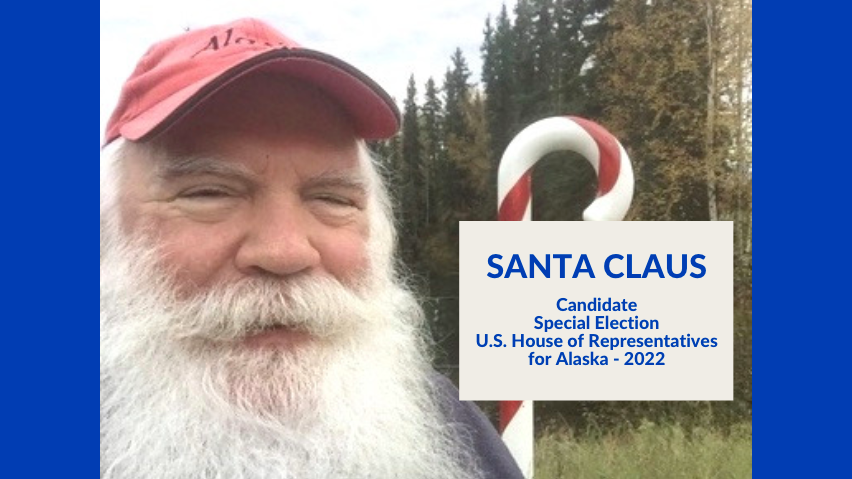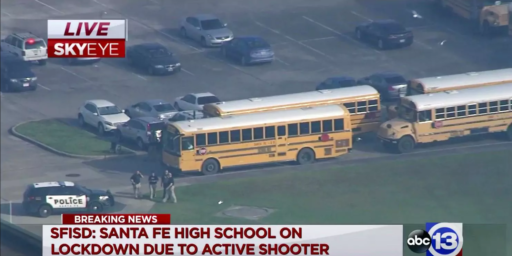Santa’s a Socialist
And other tales from the AK special election.

Commenter CSK did what I should have done for my first post on this topic, he went to the local press where there are far more details than the NYT write-up provided. Specifically, the Anchorage Daily News: 51 candidates: A wild U.S. House race takes shape in Alaska. Instead of updating the previous post, there was enough wroth commenting for a second post.
First, we all knew it, Santa is a socialist (quite frankly, I am not sure that he isn’t a utopian Marxist):
Santa’s hat was among those thrown in the ring Friday, when Santa Claus joined the race.
The man once known as Thomas O’Connor changed his legal name in 2005 and now lives, aptly, in the city of North Pole, outside Fairbanks, where he serves on the city council.
[…]
He is not affiliated with any party but describes himself as an “independent, progressive, Democratic socialist.” He also said he would not hire any staff or accept campaign donations.
And, to be honest, were I in Alaska, I might have to vote for him just for the following:
“I don’t like getting dressed up,” Claus said. “So I’m thinking, well, if I went to Congress, maybe I should just wear the Santa suit.”
Although I don’t think he has done the calculation as to DC weather (the winner will be declared in time to go to the nation’s capital during the summer). If you have ever been in DC in July, your know what I am talking about.
As to process:
The 51 candidates continued to stream in until the 5 p.m. Friday deadline, two weeks after the sudden death of Don Young, the state’s congressman of 49 years. Some of the candidates were proteges of Young; others were rivals. And their experience runs the gamut from political novices to veterans of statewide campaigns.
Watching the candidate list balloon on Friday was something of a jaw-dropper, with new candidates — known and unknown — appearing with each Division of Elections update. By the end of the day, Alaskans were looking at an election — actually, an upcoming series of them — unlike anything seen before, with dozens of candidates, a statewide mail-in primary and the implementation of ranked-choice voting, which fundamentally changes the way elections work here.
I will say that the serendipity of the deadline being April 1st is fabulous.
The large number of candidates owes to the fact that the barrier for entry is a mere $100. Quite frankly, it might be worth a hundred bucks just to have your name on the ballot as a novelty. As a certified elections nerd, I would have been tempted to run were I a resident of Alaska just so I could frame a ballot with my name on it and to be able to say that I once ran for Congress.
Also, it would be a perfect illustration of the role we expect parties to play: as a filtering mechanism for the ballot. While I frequently argue we have too few parties in the US, it is also true that unfettered access to the ballot leads to substantial confusion (and hence things like name recognition and gimmicks become potentially the most important differentiators in this type of election). Fifty-one candidates for a single seat, even with a top-four process, is simply overkill.
Also, note the intra-party competition (which really fully reduces party membership to individual selection):
Here is a full list of the candidates: Dennis “Denny” W. Aguayo (nonpartisan), Jay R. Armstrong (R), Brian T. Beal (undeclared), Tim Beck (undeclared), Nick Begich (R), Gregg B. Brelsford (undeclared), Robert Brown (nonpartisan), Chris Bye (Libertarian), John T. Callahan (R), Arlene Carle (nonpartisan), Santa Claus (undeclared), John B. Coghill Jr. (R), Christopher S. Constant (D), Breck Craig (nonpartisan), Lady Donna Dutchess (nonpartisan), Otto H. Florschutz III (R), Laurel A. Foster (nonpartisan), Thomas “Tom” R. Gibbons (R), Karyn Griffin (undeclared), Al Gross (nonpartisan), Andrew J. Halcro (nonpartisan), Ted S. Heintz (Libertarian), William “Bill” D. Hibler III (nonpartisan), John Wayne Howe (Alaska Independence), David Hughes (undeclared), Don Knight (nonpartisan), Jeff B. Lowenfels (nonpartisan), Robert “Bob” Lyons (R), Anne M. McCabe (nonpartisan), Mikel R. Melander (R), Sherry M. Mettler (undeclared), Mike Milligan (D), Richard R. Morris (nonpartisan), J.R. Myers (Libertarian), Emil Notti (D), Robert Ornelas (American Independent Party), Sarah Palin (R), Silvio E. Pellegrini (undeclared), Mary S. Peltola (D), Joshua C. Revak (R), Tara M. Sweeney (R), Jesse Sumner (R), Maxwell Sumber (R), David Thistle (undeclared), Ernest F. Thomas (D), Richard “Clayton” Trotter (R), Bradley D. Welter (R), Jason G. William (undeclared), Adam L. Wool (D), Jo Woodward (R), Stephen Wright (R).
This is quite the way to inaugurate Alaska’s new electoral process:
The election will be Alaska’s first after voters in 2020 adopted a citizens initiative under which the outcome of statewide races will be decided through ranked-choice voting — but first, all candidates run against each other in a nonpartisan primary. Only the top four vote-getters in the primary advance to the general election.
[…]
When it comes, the ballot will be a hefty one, with candidates listed alphabetically by last name, A-Z.
[…]
The final results will be tallied June 26, the deadline for ballots to arrive from overseas voters.
The four candidates who receive the most votes will advance to the Aug. 16 statewide primary, where a winner will be chosen by ranked-choice voting.
The special general election is on the same date as the primary for a full term in office, and one or more candidates could appear in both the special general and the regular primary. The four winners of that primary will advance to a ranked-choice vote during the November general election.
I will end this topic with the following quote (emphasis mine):
“My greatest qualification is that I’m a fully functional adult,” said John Callahan, a public affairs officer for the Alaska Air National Guard. He filed the necessary paperwork at the Anchorage office of the Division of Elections and paid the $100 fee just an hour before the 5 p.m. deadline. “We’ve been sending weirdos to D.C. for 50 years, and I feel like it’s just time we sent a normal person.“





(I don’t mean this as snark. I’m serious.) Given the wide choice available here I think it is safe to say that more Alaskans will feel that there is a candidate aligned to what they consider important. That should increase participation throughout the process (at least, that’s my supposition). But should we also expect that Alaska is better governed than states with fewer candidates on the ballot?
Don Young played Santa Claus for the state during his 49 years in Congress, Alaska may as well have the real deal.
I’ve been to North Pole, it’s not a big town. Although I did spend about 100% of my time there boozing it up at the Refinery Lounge so maybe I just didn’t see much.
We were there in the summer so it never got dark. The bar brought in a few tons of sand and spread it out and put up a volleyball net so we played “beach” volleyball until 2:00 AM. It was pretty entertaining as we were all quite drunk at that point.
Anyway, good luck to Mr. Claus.
@MarkedMan: The degree to which people are governed “better” than other people is dependent on the quality of the people elected (and of the people casting the ballots) more than on the number of names that appear on the ballot. Even so, a ballot with 4 choices is mathematically more likely to produce a “better” result than a ballot with one. Better still might be to have more than one space in the government for each group of ballot casters and to make those groups smaller, but this idea is relatively new, so I expect it won’t happen in my lifetime (or maybe ever).
@MarkedMan:
Maybe, but the signaling role played by parties is radically undercut with this many candidates (especially with intra-party competition as part of the scenario).
It strikes me as a false choice (indeed, in practical terms worldwide, it is) to suggest that the choice on the table is 51 candidates or 2.
FWIW, I am not a fan of either top-four or top-two (as I have written about before).
Underlying my position is the fact that there exists a range of institutional arrangements that can help produce varying-sized party systems (and, by extension, varying types of parties). The institutional arrangement in Israel, which you don’t like (and I understand why) produces one kind of party system. Germany’s institutional arrangements produce another type of party system, as does the US’ and so on. And, commensurately, different policy-making environments.
@MarkedMan:
I think you are missing some fundamental issues here. I have never, ever claimed that simply more choice equals better governance (and certainly not as linked to a single election for a single seat in a legislative body).
(Not to mention that Alaska is not governed by their US Representative).
When I talk about a preference for more parties, I am arguing about the system as a whole, not a sole election or choice. I am talking about the way in which parties represent interests and then are incentivized by the electoral cycle to represent those interests in government (and to have to negotiate deals with other members of government to do so).
Keep in mind: the only way to get more parties is to make institutional change, which would likely include more representative electoral rules, all of which would lead to better governance in my (and many others’) view.
If you’re looking for a vanity ballot, you can be an unaffiliated candidate for President in Colorado by filling out the paperwork properly and paying the $1,000 fee. Paperwork includes someone signing on to be your VP candidate and ten Coloradoans certifying that they’ll be one of your electors. We always have something over 20 candidates. (A surprising number of them represent minor parties. There’s almost always a Prohibition Party candidate.)
@Just nutha ignint cracker:
Not to mention if the goal is just to have “better” people in government we find ourselves repeating arguments as old as Plato and Aristotle about “the best” governing. This leads to conclusions about philosopher-kings and the divine rights of monarchs.
All I am asking for is for better representation of the voters, which may or may not result in better politicians (but would be better than what we currently have).
“A vote for anyone other than Santa Claus is a vote against Christmas! Do you hate Christmas?? Well, do ya, punk???”
Socialist? He’s an exploiter of the elves!
@Just nutha ignint cracker:
I don’t see how that follows. It seems just as likely that in a larger field you have to do some unusual thing to get attention. (See Trump, Donald). It may make it harder for someone who is solid, steady and a good executive.
@Steven L. Taylor:
I would like more of that type of discussion. We often get crosswise because to my ear you seem to be saying that more parties are better a priori. I know you say that’s not so, but without details. For instance, what is it about Israel’s system that gives so much power to extremists, and how is it different than Germany’s, which has a much more balanced governance?
And that’s a problem? We’re talking about Republicans here. Feature, not a bug!